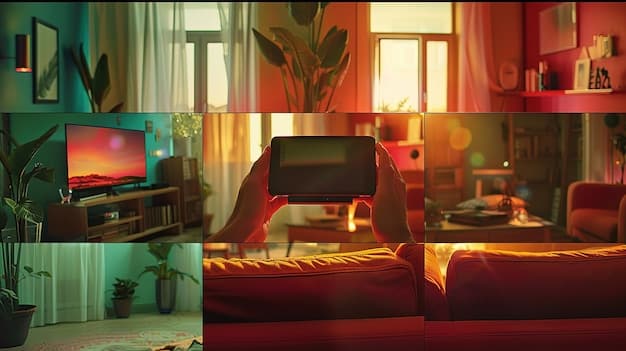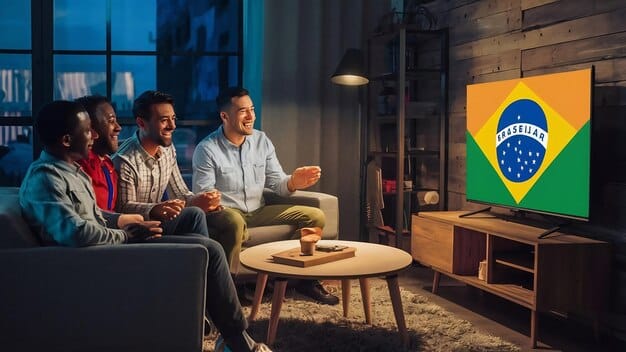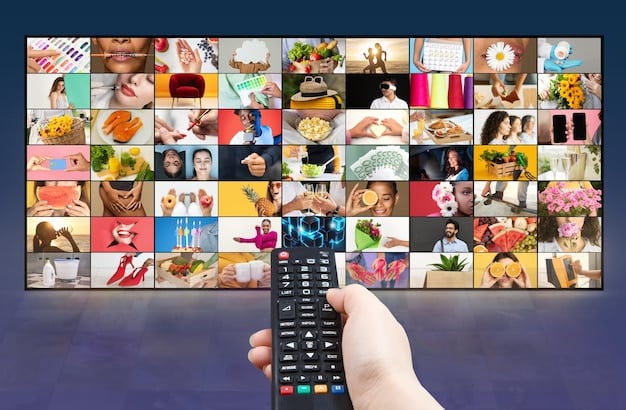Streaming vs. Cable TV in Brazil: The 2025 Showdown

Streaming vs. Cable TV in Brazil: Which Is the Better Option in 2025? This article compares the cost, content, technology, and user experience of both options, helping you decide which is the best entertainment choice for your needs in Brazil.
Navigating the world of entertainment in Brazil can be overwhelming. With a plethora of choices available, how do you decide between the traditional comfort of cable TV and the modern flexibility of streaming services? Streaming vs. Cable TV in Brazil: Which Is the Better Option in 2025? This article breaks down the key differences.
We’ll delve into cost, content, technology, and user experience, providing a comprehensive guide to help you make an informed decision. Let’s explore which option best suits your entertainment needs in the Brazilian landscape.
Streaming vs. Cable TV in Brazil: Understanding the Options
The debate between streaming vs. cable TV in Brazil: Which is the better option in 2025? continues to evolve. Before diving into the specifics, let’s establish a clear understanding of what each option entails. Cable TV, a long-standing staple, offers a traditional approach to television viewing, while streaming platforms have emerged as a dynamic alternative.
Cable TV provides a bundle of channels delivered through a physical cable connection, offering a structured and scheduled viewing experience. Streaming services, on the other hand, grant access to a vast library of on-demand content via the internet, allowing viewers to watch what they want, when they want.
Key Differences at a Glance
The core distinction lies in the delivery method and the viewing experience. Cable TV relies on a fixed schedule and a pre-determined channel lineup, whereas streaming offers personalized and on-demand entertainment.
- Content Accessibility: Cable TV provides a fixed selection of channels, while streaming offers a wide variety of on-demand content.
- Viewing Experience: Cable TV follows a scheduled broadcast, while streaming allows for personalized viewing.
- Technology: Cable TV requires a physical cable connection, while streaming relies on an internet connection.
Understanding these fundamental differences is crucial in determining which option aligns best with your individual preferences and viewing habits. As we move forward, we will explore these aspects in greater detail, providing a clearer picture for making an informed decision.
In conclusion, both cable TV and streaming offer distinct advantages and disadvantages. Cable provides a familiar, structured experience, while streaming appeals to those seeking flexibility and personalized content. Understanding these differences is the first step in choosing the right entertainment option for you.

Cost Analysis: Streaming vs. Cable TV in Brazil in 2025
Cost is a significant factor when choosing between streaming vs. cable TV in Brazil: Which is the better option in 2025?. Comparing the pricing structures of both options reveals a nuanced landscape, with various factors influencing the overall cost.
Cable TV packages often include a base price for a set number of channels, with additional fees for premium channels, equipment rental, and installation. Streaming services, conversely, typically operate on a subscription basis, offering a range of plans with varying features and content libraries.
Breaking Down the Expenses
A comprehensive cost analysis requires considering both the upfront and recurring expenses associated with each option.
- Cable TV Costs: Base package price, premium channel fees, equipment rental, installation fees.
- Streaming Costs: Subscription fees, internet service costs, potential device costs.
- Hidden Costs: Data overage charges for streaming, cancellation fees for cable TV.
It’s important to assess your viewing habits and content preferences to determine the most cost-effective option. If you primarily watch a few specific channels, a basic cable package might suffice. However, if you enjoy a diverse range of content, streaming services might offer better value for money.
Ultimately, the cost comparison depends on your individual needs and usage patterns. Careful consideration of the specific expenses involved in each option will guide you toward the most budget-friendly entertainment solution. Calculating your potential costs, including any hidden fees, will help inform your decision when considering streaming vs. cable TV in Brazil: Which is the better option in 2025?
Content Variety and Quality: What’s on Offer?
The scope and caliber of content available are pivotal in the streaming vs. cable TV in Brazil: Which is the better option in 2025? debate. Both platforms provide access to a vast array of programming, but the nature and quality of that content can vary significantly.
Cable TV traditionally offers a curated selection of channels, featuring news, sports, movies, and entertainment shows. Streaming services, conversely, provide a more extensive and diverse library of on-demand content, including original series, documentaries, and a wide range of licensed titles.
Exploring the Content Landscape
Assessing the content offerings of both cable TV and streaming platforms allows for a more informed decision.
- Breadth of Content: Streaming services provide a wider variety of on-demand content compared to cable TV.
- Original Programming: Streaming platforms invest heavily in original series and films, offering unique and exclusive content.
- Content Quality: Both cable TV and streaming services vary in content quality, ranging from high-budget productions to low-budget shows.
Your specific interests and preferences will significantly influence your satisfaction with the content available on each platform. If you value live sports and breaking news, cable TV might be more appealing. However, if you prefer binge-watching original series and exploring niche genres, streaming services could be a better fit.
The decision boils down to your personal tastes and content consumption habits. By carefully evaluating the content libraries and programming schedules of both cable TV and streaming services, you can select the option that best aligns with your entertainment needs and preferences. For those seeking a broader range of content, the answer to streaming vs. cable TV in Brazil: Which is the better option in 2025? may lean towards streaming.
Technology and User Experience: Ease of Use and Accessibility
User experience and technological aspects play a key role in the consideration of streaming vs. cable TV in Brazil: Which is the better option in 2025?. The ease of use, accessibility, and overall technological sophistication of each platform significantly impact the viewing experience.
Cable TV relies on traditional set-top boxes and remote controls, providing a familiar and straightforward interface. Streaming services, on the other hand, leverage apps and digital platforms, offering a more interactive and personalized experience.
Comparing the Technology and Interface
Analyzing the technological features and user interfaces of both options provides valuable insights.
- Intuitive Interface: Streaming services generally offer more user-friendly interfaces with personalized recommendations.
- Mobile Accessibility: Streaming platforms allow for viewing on multiple devices, including smartphones, tablets, and laptops.
- Technological Requirements: Cable TV requires a stable cable connection, while streaming demands a reliable internet connection.
Your technical proficiency and comfort level with digital platforms will influence your preference. If you prefer a simple and traditional interface, cable TV might be more suitable. However, if you are tech-savvy and enjoy exploring advanced features, streaming services could offer a more engaging experience.
Ultimately, the choice depends on your comfort level with technology and your desire for personalized features. By carefully evaluating the user interfaces and technological requirements of both options, you can determine which platform offers the most seamless and enjoyable viewing encounter. When evaluating streaming vs. cable TV in Brazil: Which is the better option in 2025?, consider which technology aligns with your daily habits.

Future Trends and Predictions: The Road Ahead
Predicting future trends is essential when considering streaming vs. cable TV in Brazil: Which is the better option in 2025?. As technology continues to advance and consumer preferences evolve, the entertainment landscape is poised for significant changes.
The rise of 5G internet, the increasing popularity of smart TVs, and the ongoing development of new streaming platforms are all factors shaping the future of entertainment. These advancements promise to enhance both the quality and accessibility of streaming services, potentially widening the gap between streaming and cable TV.
Anticipating Future Developments
Staying informed about emerging trends will help you make a more future-proof decision.
- 5G Impact: The widespread implementation of 5G internet will improve streaming speeds and reliability.
- Smart TV Integration: Smart TVs will become even more integrated with streaming platforms, offering seamless access to content.
- Bundling Services: Cable TV providers may bundle streaming services with their traditional packages to remain competitive.
It’s important to anticipate these changes and consider how they might impact your entertainment experience. While cable TV might adapt by integrating streaming services, the inherent flexibility and on-demand nature of streaming suggest a continued shift in consumer preference.
The future of entertainment in Brazil is likely to be increasingly dominated by streaming services, driven by technological advancements and changing consumer habits. Keeping abreast of these trends will enable you to make an informed decision on this topic of streaming vs. cable TV in Brazil: Which is the better option in 2025? that aligns with your long-term entertainment needs.
| Key Aspect | Brief Description |
|---|---|
| 💰 Cost | Streaming offers tiered subscriptions; cable includes equipment fees. |
| 🎬 Content | Streaming boasts on-demand libraries; cable provides linear channels. |
| 📱 Technology | Streaming requires internet, accessible on multiple devices. |
| 🔮 Future Trends | 5G and bundled services will shape entertainment choices in Brazil. |
Frequently Asked Questions
Generally, streaming can be more affordable, especially if you choose a basic plan and avoid additional fees. Cable often includes equipment rental and premium channel costs, increasing the overall expense.
Yes, many streaming services offer live sports channels and packages. However, availability may vary, so check if your favorite sports leagues are included before subscribing.
A stable internet connection with a speed of at least 25 Mbps is recommended for smooth streaming in HD quality. Faster speeds are preferable for 4K streaming or multiple simultaneous streams.
Yes, Brazil has several local streaming platforms offering Brazilian movies, series, and TV shows. These services often provide content tailored to the Brazilian audience.
While cable TV is facing increasing competition from streaming, it’s unlikely to disappear completely by 2025. Cable providers may adapt by offering bundled services and improved technology to retain customers considering streaming vs. cable TV in Brazil: Which is the better option in 2025.
Conclusion
In the ongoing discussion of streaming vs. cable TV in Brazil: Which is the better option in 2025?, both platforms present unique advantages. Streaming offers flexibility, a vast content library, and personalized experiences, while cable TV provides a familiar, structured approach to entertainment.
Ultimately, the best choice depends on your individual needs, preferences, and technological fluency. By carefully weighing the factors discussed in this article, you can determine which option best suits your lifestyle and entertainment requirements.





